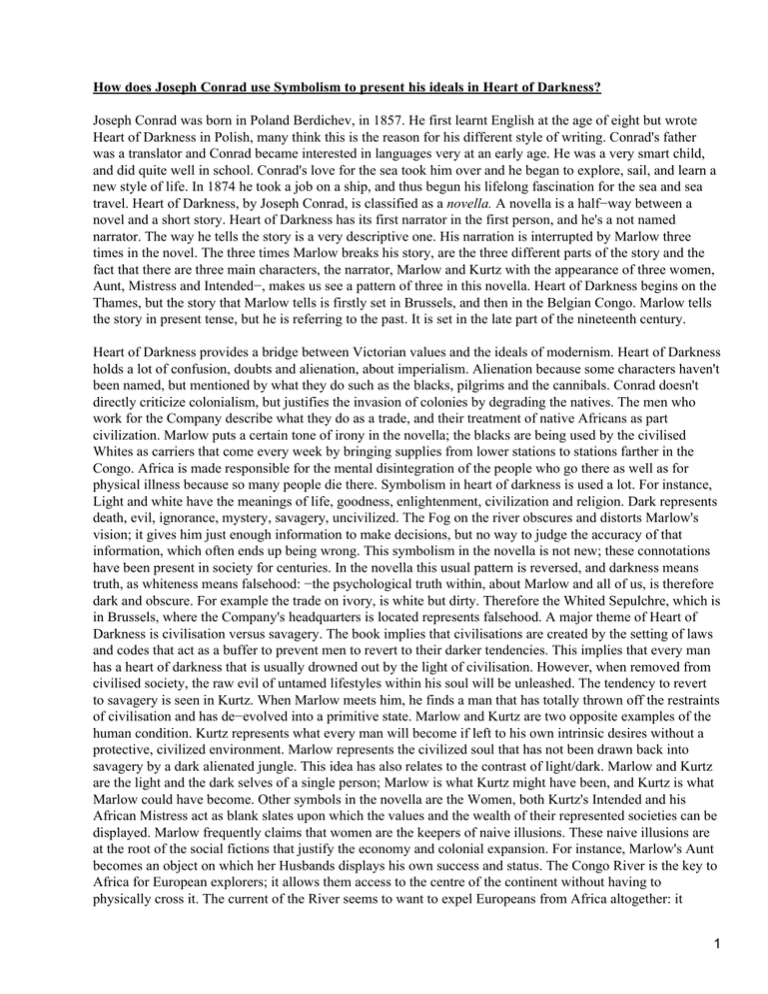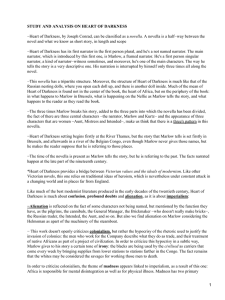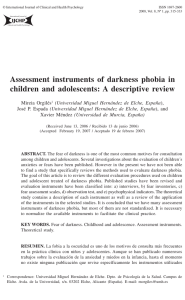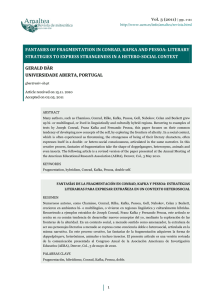Heart of Darkness; Joseph Conrad
Anuncio

How does Joseph Conrad use Symbolism to present his ideals in Heart of Darkness? Joseph Conrad was born in Poland Berdichev, in 1857. He first learnt English at the age of eight but wrote Heart of Darkness in Polish, many think this is the reason for his different style of writing. Conrad's father was a translator and Conrad became interested in languages very at an early age. He was a very smart child, and did quite well in school. Conrad's love for the sea took him over and he began to explore, sail, and learn a new style of life. In 1874 he took a job on a ship, and thus begun his lifelong fascination for the sea and sea travel. Heart of Darkness, by Joseph Conrad, is classified as a novella. A novella is a half−way between a novel and a short story. Heart of Darkness has its first narrator in the first person, and he's a not named narrator. The way he tells the story is a very descriptive one. His narration is interrupted by Marlow three times in the novel. The three times Marlow breaks his story, are the three different parts of the story and the fact that there are three main characters, the narrator, Marlow and Kurtz with the appearance of three women, Aunt, Mistress and Intended−, makes us see a pattern of three in this novella. Heart of Darkness begins on the Thames, but the story that Marlow tells is firstly set in Brussels, and then in the Belgian Congo. Marlow tells the story in present tense, but he is referring to the past. It is set in the late part of the nineteenth century. Heart of Darkness provides a bridge between Victorian values and the ideals of modernism. Heart of Darkness holds a lot of confusion, doubts and alienation, about imperialism. Alienation because some characters haven't been named, but mentioned by what they do such as the blacks, pilgrims and the cannibals. Conrad doesn't directly criticize colonialism, but justifies the invasion of colonies by degrading the natives. The men who work for the Company describe what they do as a trade, and their treatment of native Africans as part civilization. Marlow puts a certain tone of irony in the novella; the blacks are being used by the civilised Whites as carriers that come every week by bringing supplies from lower stations to stations farther in the Congo. Africa is made responsible for the mental disintegration of the people who go there as well as for physical illness because so many people die there. Symbolism in heart of darkness is used a lot. For instance, Light and white have the meanings of life, goodness, enlightenment, civilization and religion. Dark represents death, evil, ignorance, mystery, savagery, uncivilized. The Fog on the river obscures and distorts Marlow's vision; it gives him just enough information to make decisions, but no way to judge the accuracy of that information, which often ends up being wrong. This symbolism in the novella is not new; these connotations have been present in society for centuries. In the novella this usual pattern is reversed, and darkness means truth, as whiteness means falsehood: −the psychological truth within, about Marlow and all of us, is therefore dark and obscure. For example the trade on ivory, is white but dirty. Therefore the Whited Sepulchre, which is in Brussels, where the Company's headquarters is located represents falsehood. A major theme of Heart of Darkness is civilisation versus savagery. The book implies that civilisations are created by the setting of laws and codes that act as a buffer to prevent men to revert to their darker tendencies. This implies that every man has a heart of darkness that is usually drowned out by the light of civilisation. However, when removed from civilised society, the raw evil of untamed lifestyles within his soul will be unleashed. The tendency to revert to savagery is seen in Kurtz. When Marlow meets him, he finds a man that has totally thrown off the restraints of civilisation and has de−evolved into a primitive state. Marlow and Kurtz are two opposite examples of the human condition. Kurtz represents what every man will become if left to his own intrinsic desires without a protective, civilized environment. Marlow represents the civilized soul that has not been drawn back into savagery by a dark alienated jungle. This idea has also relates to the contrast of light/dark. Marlow and Kurtz are the light and the dark selves of a single person; Marlow is what Kurtz might have been, and Kurtz is what Marlow could have become. Other symbols in the novella are the Women, both Kurtz's Intended and his African Mistress act as blank slates upon which the values and the wealth of their represented societies can be displayed. Marlow frequently claims that women are the keepers of naive illusions. These naive illusions are at the root of the social fictions that justify the economy and colonial expansion. For instance, Marlow's Aunt becomes an object on which her Husbands displays his own success and status. The Congo River is the key to Africa for European explorers; it allows them access to the centre of the continent without having to physically cross it. The current of the River seems to want to expel Europeans from Africa altogether: it 1 makes travel upriver slow and difficult, but the flow of water makes travel downriver, back toward civilization, fast. Heart of Darkness represents Marlow's concerns to whatever degree, great or small, of Conrad− and his journey to find himself. Marlow reiterates often enough that he is on a spiritual voyage of self−discovery. He remarks casually but crucially that he did not know himself before setting out, and that he liked work for the chance it provides to find yourself in what no other man can know. At a spiritual level, the journey is a temptation to de−evolve, a record of remote kinship with the wild and passionate uproar, of a final rejection of the abomination: The mind of a man is capable of anything, because everything is in it, all the past as well as all the future. Marlow's temptation is made through his exposure to Kurtz, a white man and sometimes an idealist who had fully responded to the wilderness. Heat of Darkness is a journey into the unconscious, and confrontation of an entity within the self. Certain circumstances of Marlow's voyage, looked in these terms, take on a new importance. The true night journey can occur only in sleep or in a waking dream of a profoundly intuitive mind. Marlow insists on the dreamlike quality of his narrative: It seems to me I am trying to tell you a dream −making a vain attempt, because no relation of a dream can convey the dream sensation. Even before leaving Brussels, Marlow felt as though he was about to set off for centre of the earth, not the centre of a continent. 2


